Health Bloggers Still Push Kombucha Despite High Levels of Fluoride
In this post, I will cover the recent explosion of kombucha love, how it has been promoted by health bloggers, and talk about why it’s actually really bad for you. I will also uncover why health bloggers are not motivated to tell the truth about kombucha and fluoride.
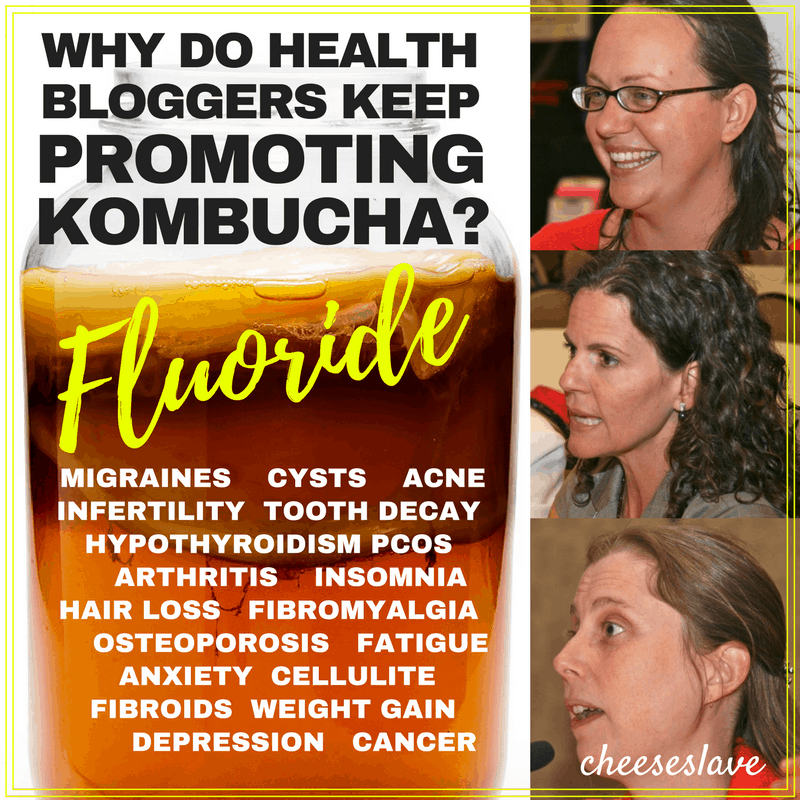
Are you still drinking kombucha? If so, you really should stop. It’s so five years ago. Sadly, many health bloggers are still pushing kombucha even though it is loaded with fluoride. Fluoride causes lots of health problems, from acne to cellulite to hormonal disorders to migraines, Hashimoto’s thyroiditis, PCOS, and infertility and cancer.

Why Are Health Bloggers Still Promoting Kombucha?
This is a long post, but as they say, if I had more time, I would have written a shorter letter. In this post, I will cover the recent explosion of kombucha love, how it has been promoted by health bloggers, and talk about why it’s actually really bad for you. I will also uncover why health bloggers are not motivated to tell the truth about kombucha and fluoride.
Kombucha: A Recent Trend
Kombucha has become very trendy over the past decade, largely due to health bloggers who actively promote it. The health blogosphere is an echo chamber of information that is repeated over and over… look what happened with the fermented cod liver oil scandal…something very few health bloggers covered. We are seeing a similar story play out with fluoride and kombucha. Bloggers have personal reasons and financial ties that keep them from investigating information… and then it gets repeated across the blogosphere like a virus.
Fake News
The news about fluoride in kombucha has been brewing on the internet for years… but it has been ignored by most health bloggers.
As a fellow health blogger, I’m disturbed by the massive amount of misinformation on the web. In today’s age of “fake news,” there is so much garbage online, it’s hard to know what to believe. People who are struggling with health challenges seek out these websites because they are looking for good advice. Anyone can blog in this day and age, and in my opinion, most bloggers don’t take this responsibility as seriously as we should.

I have been guilty of posting bad information in the past (I used to promote FCLO and kombucha). We all make mistakes. No one is perfect, that’s for sure. I know I will continue to make mistakes but I will do my best to correct them. I take my role very seriously, as I think anyone with a health blog should. My hope is that people share this post with people who need this information. I pray that many of these health bloggers will take action to correct their posts.
Before I cover the bloggers who continue to push kombucha and get into why I think this is happening, I first want to highlight a few individuals who wrote articles warning people about fluoride in kombucha. I am grateful for these people who speak out — they are a gift to us all.
Donna Gates Of Body Ecology
The first post I found warning about high levels of fluoride in kombucha was written by Donna Gates of Body Ecology. I love Donna and had the honor of interviewing her a few years ago. I am very grateful to Donna for all the work she has done and continues to do to help people.

Back in 2012, Gates wrote a post warning about fluoride in kombucha. She wrote:
“Kombucha may contain heavy metals and fluoride. The tea fungus (or SCOBY) floating around in your kombucha is biosorbent. Like a magnet to iron, it binds to contaminants and heavy metals… If you’re concerned about fluoride, a 2008 study published in Food Chemistry found kombucha to contain as much as 3.2 mg/g of fluoride. (13) This is significantly more than what’s found in unfermented black tea.” (Source)
I actually read the study Gates is referencing. They tested kombucha and found that it has 3 times more fluoride than black tea.
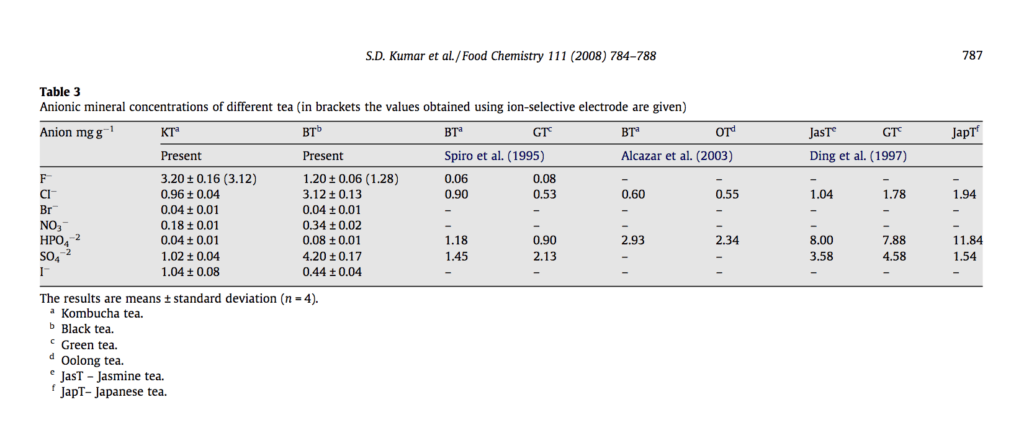
If you’re wondering why the kombucha had more fluoride than black tea, I am thinking maybe it has to do with what Gates said in her article: “The tea fungus (or SCOBY) floating around in your kombucha is biosorbent. Like a magnet to iron, it binds to contaminants and heavy metals.”
This is why I don’t recommend making kombucha with any kind of tea (even yerba matte, which has been found to be low in fluoride) — because the SCOBY itself contains a lot of fluoride and aluminum.
Granted, this is just one study, but I find it very interesting. And this should underscore the fact that we just don’t have much information on kombucha — we just don’t know how much fluoride or aluminum is in it.
Will and Susan Revak of OraWellness
A year later, in 2013, Will and Susan Revak, who run a company called OraWellness, wrote an article saying they quit drinking kombucha due to high levels of fluoride. They speculated that there may be as much as 25 mg of fluoride per 16-ounce serving.

So, is there 25 mg of fluoride in 16 ounces of kombucha? I don’t think so… In this article, the Revaks wrote:
“A website by a pro-fluoridation infant medical group states that a cup of black tea contains 7.8 mg of fluoride.(1) However, according to Andreas Schuld in his article titled “Fluoride – What’s Wrong With This Picture?”, “Recent analyses have revealed a fluoride content of 22.2 mg per teabag or cup in Chinese green tea, and 17.25 mg of soluble fluoride ions per teabag or cup in black tea. Aluminum content was also high—over 8 mg.”
I went to try to find the source for the first claim that there is 7.8 mg of fluoride in a cup of black tea — it was from an article on Babycenter which has since been taken down. I did find the original article on the Wayback Machine. It was just a claim with no evidence to back it up.
The second claim they make is that there is 22.2 mg per teabag or cup of green tea. I traced this to the original source and there is no study to back it up. So I don’t trust that either.
To their credit, the Revaks did not use those numbers, they went with the numbers quoted by the Linus Pauling Institute:
“That said, for the sake of balance, we also have to quote the Linus Pauling Institute and their figures on the content of fluoride in various teas, which is much lower… They suggest that the amount of fluoride in green and black teas ranges from .3 – .5 mg fluoride per 8 ounces of tea.”
I think that is likely to be much more accurate (and possibly even too conservative), as you will see below.

How Much Fluoride is Actually In Tea?
Is there a lot of fluoride in tea? Yes. Is there 22 mg per cup of tea? No evidence of that.
There are many studies online that show different amounts of fluoride in tea. In a 2010 study, they found that the old way of testing for fluoride might not be accurate, and there may be anywhere from 2-9 times more fluoride in tea than they thought:
“Most published reports show 1 to 5 milligrams of fluoride per liter of black tea, but a new study shows that number could be as high as 9 milligrams.”
When they used the diffusion method to test for fluoride, they got much higher readings of fluoride from the tea:
“Most published studies about black tea traditionally have used a method of measuring fluoride that doesn’t account for the amount that combines with aluminum to form insoluble aluminum fluoride, which is not detected by the fluoride electrode. Whitford compared that method with a diffusion method, which breaks the aluminum-fluoride bond so that all fluoride in the tea samples can be extracted and measured.
He tested seven brands of store-bought black tea, steeping each for five minutes in deionized water, which contains no fluoride. The amount of fluoride in each sample was 1.4 to 3.3 times higher using the diffusion method than the traditional method.” (Source)
So, how much fluoride is in tea? We don’t know. But it’s somewhere between 1-9 mg per liter. There are 4.2 cups in a liter, so that means there is anywhere from .2 mg to 2 mg of fluoride in a single cup of tea.
The limit for fluoride in drinking water, according to the U.S. Department of Health and Human Services, is .7 mg per LITER. Which means that one cup of tap water with added fluoride is not allowed to have more than .17 mg of fluoride.
So, however you measure it, and whatever study you read, we know for a fact that tea is high in fluoride. Doesn’t matter how long you steep it or what kind it is. Yes, some teas are lower than others, but ALL tea is high in fluoride unless it is herbal tea. It’s not the water you brew it with — it’s in the tea leaves.
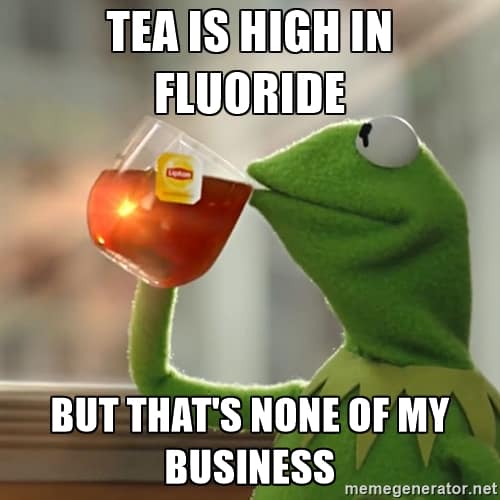
How Much Fluoride is In Kombucha?
How much fluoride is in kombucha? Again, we don’t know.
We only have one study showing that fluoride is three times higher in kombucha than in tea. However, since the process of making kombucha involves steeping the tea for several days with a SCOBY that is probably loaded with fluoride and aluminum (since it is a bisorbent fungus that soaks up and retains heavy metals — read this study and this study,) it is very feasible that the fluoride in the tea increases during the process of fermentation.
Regardless, we know all tea (unless it is herbal tea) is high in fluoride. Therefore, kombucha tea is also high in fluoride.
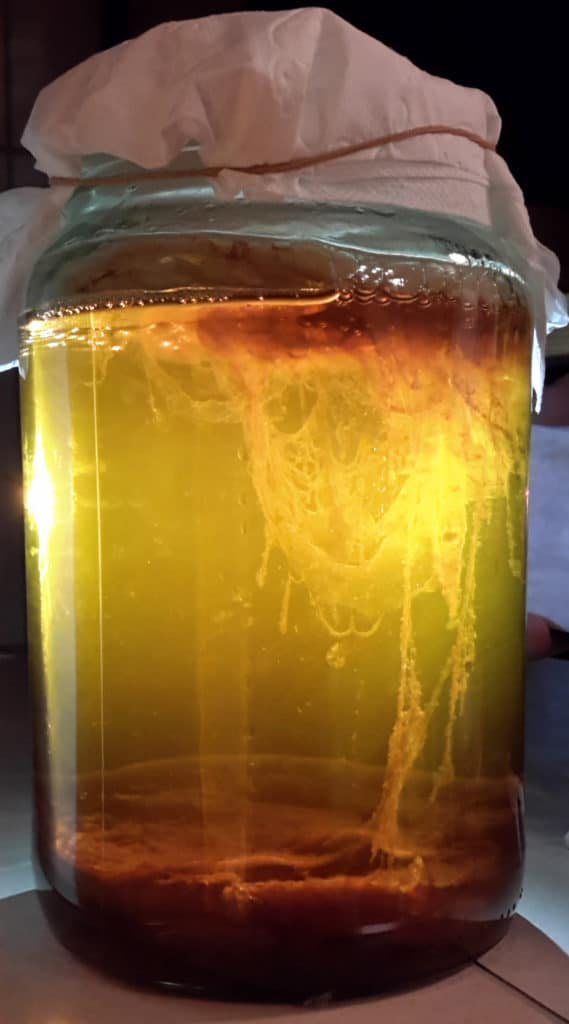
How Much Fluoride Should We Be Consuming?
Finally, we need to keep in mind that the recommended daily intake of fluoride in the UK is .05 mg per kg of body weight, or 4.2 mg for men, 3.2 mg for women, and 1.2 mg for children. (Source)
The United States has the same recommendations as the UK, however, they say that if your water is fluoridated, optimal fluoride intake is HALF that, or 2.1 for men, 1.6 mg for women, and .6 for children. And, according to the CDC, “In the United States, water and processed beverages (e.g., soft drinks and fruit juices) can provide approximately 75% of a person’s fluoride intake… Foods and ingredients used in food processing vary in their fluoride content.” (Source)
Most areas of America are fluoridated, and many crops are sprayed with fluoridated pesticides (cryolite), so unless you eat everything made at home from scratch from all organic, you’re getting your fair share of fluoride in your diet, even if you only drink filtered water. Adding more fluoride via kombucha can’t help and can only hurt.
Bloggers Who Promote Kombucha
Now, let’s take a look at some of the bloggers who continue to promote kombucha despite the extremely high levels of fluoride… and I’ll share some of my theories about why I think this is happening.
I chose a few bloggers to highlight in this post… why these specific bloggers? Two of them wrote articles downplaying fluoride in kombucha. The other one I included because she has one of the top ranking posts for kombucha (top 5 search results on page one of Google). I also happen to know these bloggers from my old days in the Real Food Media blog network, so I have more understanding of their bias.
That said, there are plenty of other bloggers out there who promote kombucha… If I dig around on Google a little deeper, there is a long list of health blogs that tout the magical wonders of kombucha and neglect to warn their readers about the high levels of fluoride: Dr. Axe, Wellness Mama, Mark’s Daily Apple, Food Babe, Robb Wolf, Primal Palate, The Kitchn, Autoimmune Wellness, Stupid Easy Paleo, Green Med Info, Authority Nutrition, Whole Lifestyle Nutrition, Phoenix Helix, Weed ’em & Reap, The Paleo Mom, and Balanced Bites. (There are many, many more — if I tried to list them all, I’d never get this post up.)
The Healthy Home Economist
In 2013, Sarah Pope of the Healthy Home Economist, wrote a blog post rebuttal to the OraWellness post. This post comes up at the very top of the Google search results when you search for “fluoride in kombucha”.

In her rebuttal, Pope disputes the OraWellness assertion that kombucha is high in fluoride. She says kombucha is not high in fluoride as long as the tea is organic, you use the right kinds of tea, and you don’t steep it very long. And she says, the longer you ferment the kombucha, the less fluoride it will have.
She points to two sources of evidence: (1) A study quoted by the “Linus Paul Institute” (sic — should be Linus Pauling Institute) and (2) A study done by the Weston Price Foundation.
Chinese Study Referenced By Linus Pauling Site
First, let’s talk about the quoted study from the Linus Pauling Institute…
Pope doesn’t refer to the study quoted by the Linus Pauling Institute directly. She only quotes what they say about the study.
Here is the section she is referring to:

The study they are quoting is this one from China (1998). I went and read the study and found this chart, which is more detailed than the one they made on the Linus Pauling Institute site:
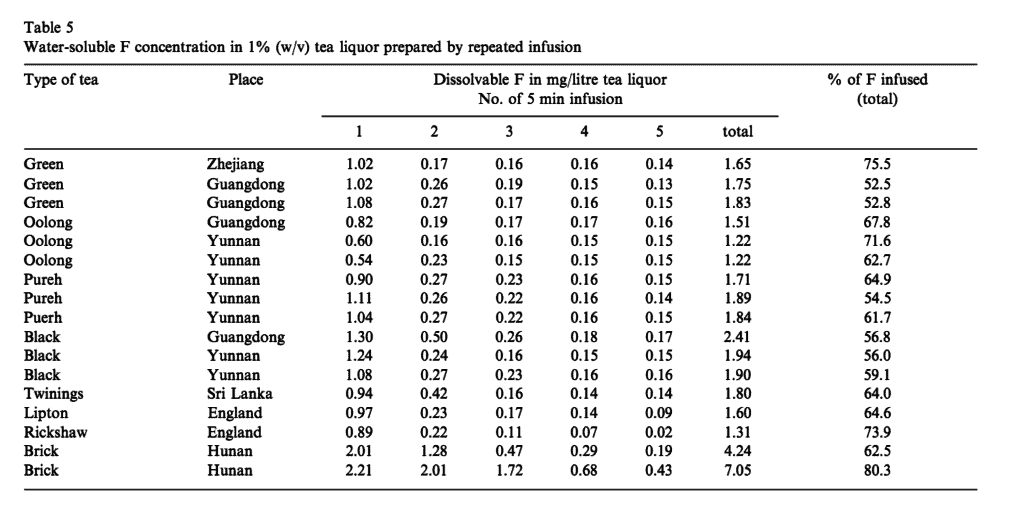
As you can see, all the teas they tested in the first column, with the exception of Oolong, registered higher in fluoride than the U.S. Department of Health and Human Services recommends for fluoridated water (.7 mg per liter). So all these teas are high in fluoride except the oolong.
Furthermore, if you read the actual study, it shows that the amount of fluoride in the different tea samples varies widely depending on which region of China the tea came from:

And you can’t just say “oolong is lower in fluoride so you should make your kombucha with oolong” because it depends where the oolong comes from…
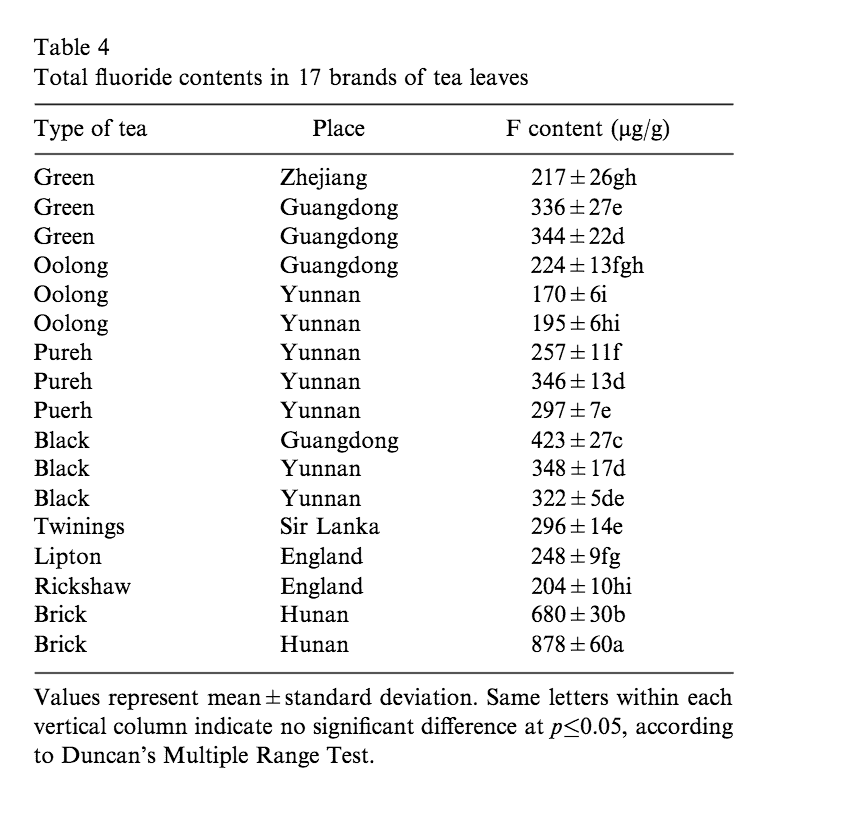
This is because different areas have different amounts of fluoride in the soil. Also, fluoride in tea varies depending on how mature the plants are. So it’s really impossible to know what you are getting. For this reason alone, I say, if you are trying to avoid fluoride, you should avoid drinking all tea unless it is herbal tea. (Or unless you run it through a reverse osmosis filter before you drink it. Kidding, but not.)
Weston A. Price Study Re: Organic Tea
Pope goes on to say that organic tea is lower in fluoride.
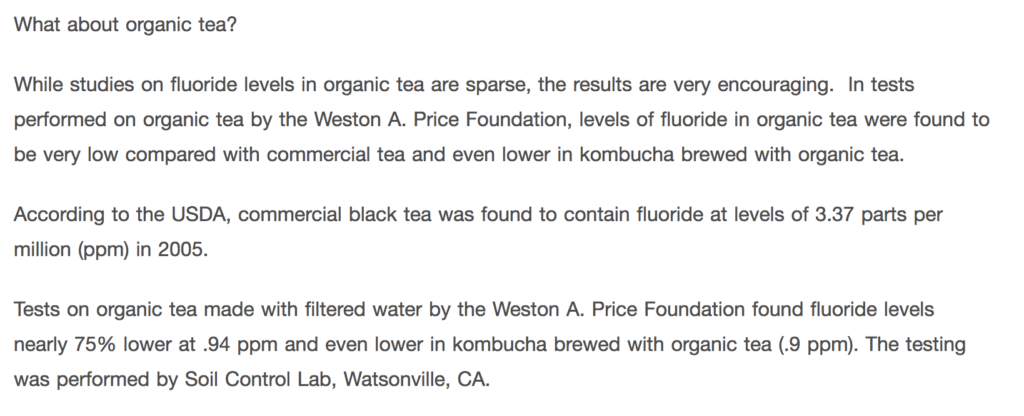
Her only evidence to support this claim is one study allegedly done by the Weston A. Price Foundation that showed that “the levels of fluoride in organic tea were found to be very low compared with commercial tea and even lower in kombucha brewed with organic tea.”
Well, she doesn’t even link to that study. I also tried to find it on the WAPF website and they don’t link to it either. It’s not anywhere online as far as I could tell. We have no idea what kinds of teas they used, or how the study was done.
And, yeah, I’m really not feeling too confident about what the WAPF says, especially because we have a long history of their studies showing data that’s clearly wrong and cherrypicked.
This whole “organic tea is lower in fluoride” myth was also debunked back in 2011 by Melissa Gardner, author of [easyazon_link identifier=”069272155X” locale=”US” tag=”cheeseslave0e-20″]The End of Acne[/easyazon_link] in her blog post, Fluoride Content of Organic vs. Non-Organic Tea.
Sarah’s Recommendations to Reduce Fluoride in Kombucha
Kombucha apologist that she is, Sarah gives her recommendations for how to continue brewing and drinking kombucha to minimize the fluoride.
1. Source Organic Tea
Sarah says we will have less fluoride in our kombucha if we use organic tea.

There is no evidence of this, other than what Sally Fallon says. There is no study available.
It’s not logical anyway, because all camellia sinensis plants take up fluoride via the roots and store it in the leaves. Why would it matter if the plants were organic?
2. Check the Country of Origin
Pope says that we should check the country of origin and avoid buying tea from a “fluoride belt”.

This is bogus because in the Chinese study she referenced, the fluoride in the soil varies greatly within different regions of China. So checking the country of origin is meaningless.
3. Limit Steep Time
Sarah says we should limit the time we steep the tea to reduce fluoride.

However, according to the study she’s quoting the biggest spike of fluoride absorption is in the initial 5 minutes. With the exception of the cheap brick teas, they didn’t see a big increase in fluoride in any of the teas after 5 minutes.
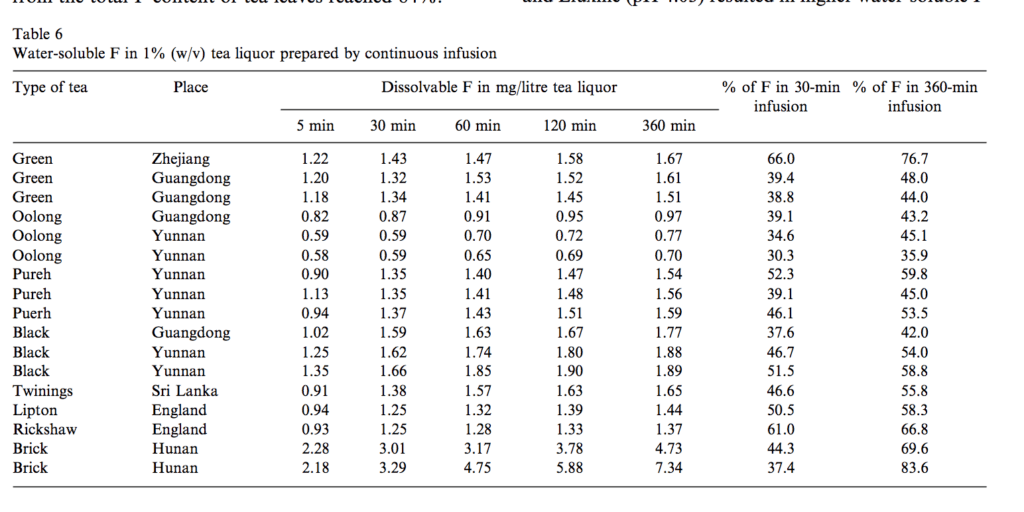
So this doesn’t really solve anything.
4. Maximize Fermentation Time
Sarah suggests that we increase fermentation time in order to reduce the fluoride in the kombucha.

This statement has zero evidence to support it: “it seems likely from early test results that the fermentation process itself removes some of the fluoride from the tea.”
Pope is parroting something Sally Fallon published on the WAPF website. She claims that the SCOBY somehow magically removes the fluoride from the kombucha the longer it steeps:
“Researchers looking at the toxic effects of fluoride have recently raised concerns about kombucha because most commercial tea is very high in fluoride. Fortunately, kombucha made with organic tea contains very little fluoride. We had fluoride levels tested in organic black tea and in the kombucha made with the tea. The levels in the tea were only slightly higher than those in the filtered water from which it was made and actually slightly lower in the kombucha than in the black tea. These results suggest that the process of fermentation actually removes some of the fluoride from the tea and may explain why the kombucha “mushroom” eventually gets black. These older, darkened “mushrooms” can be replaced with the newer, cleaner “babies” that grow on top of the original “mushroom” during the fermentation process.” (Source)
Researchers? Which researchers? Again, that mythical study the WAPF allegedly did — but there is no evidence of it online. So I guess we should just trust Sally Fallon?
As Tucker Carlson would say…

This claim that the kombucha SCOBY removes fluoride directly contradicts the two studies Donna Gates presented in her article showing that kombucha fungus actually absorbs fluoride and the one lab test that showed that kombucha had 3 times more fluoride than tea. (Scroll up to the section above about Donna Gates’s article.)
Sarah Pope’s Bias
I’d like to examine why Pope wrote this post because it’s relevant when looking at her bias… When I looked at Sarah’s rebuttal post, it’s clear to me why Sarah wrote it… she’s obviously an affiliate for OraWellness (see the image below). Sarah Pope never mentions the fact that her blog contains affiliate links, which is a violation of FTC regulations… so you wouldn’t know that that’s an affiliate link. But I know what affiliate links look like.
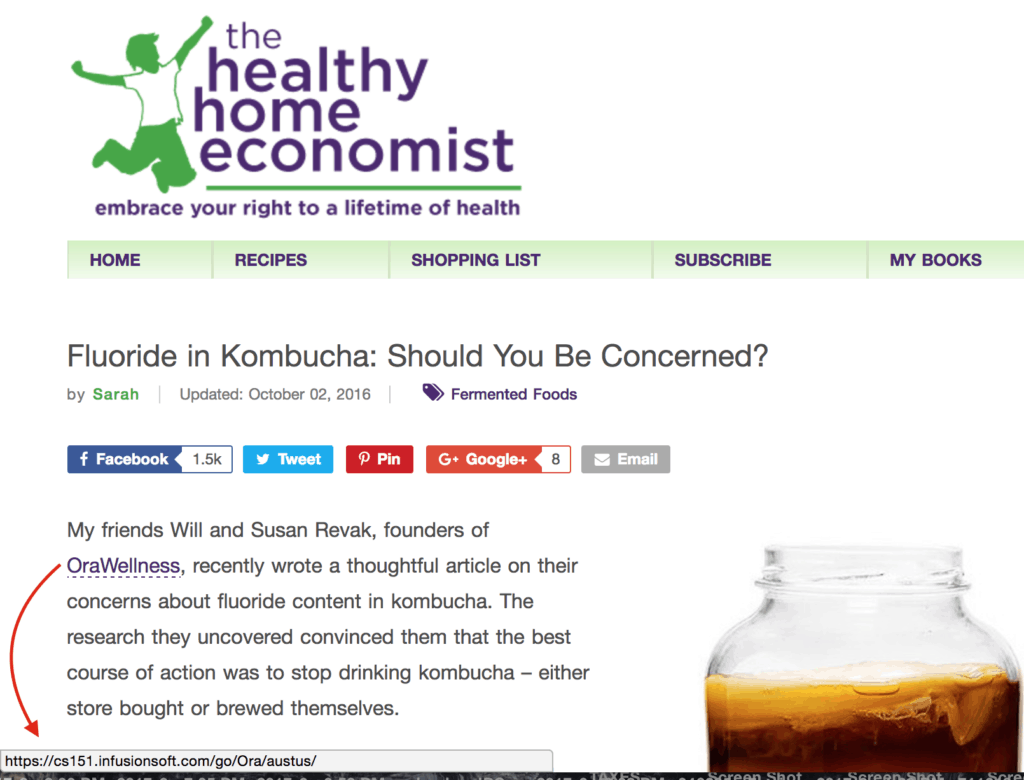
If I had to take a wild guess, I’d say Sarah felt she needed to write the OraWellness rebuttal… since she didn’t want to have to give up her affiliate relationship with OraWellness, but wanted to continue to promote kombucha.
Sarah is a board member of the Weston A. Price Foundation and is intensely loyal to Sally Fallon. So loyal, in fact, that she named one of her children “Fallon”. She once told me, “When Sally says jump, I say how high?”
Sally has been unrelenting of her support of kombucha, despite anything anyone says. We’ve see Sally demonstrate this same behavior throughout the FCLO scandal. She continues to champion FCLO, despite mounting evidence that it is not safe for consumption.
So it’s clear that Sarah Pope has financial and business ties to organizations that influenced the post she wrote. And it’s also clear that the post she wrote does not provide adequate evidence that kombucha is low in fluoride, nor does it adequately show that we should feel confident drinking kombucha if we want to avoid fluoride.
The saddest part is, many people are reading Sarah’s blog and taking her advice.
In this heart-wrenching post by Eileen Lard of the Phoenix Helix blog, she talks about how she had to start back on medication for arthritis after 4 years on one of the most restrictive diets on the planet, Auto Immune Paleo.
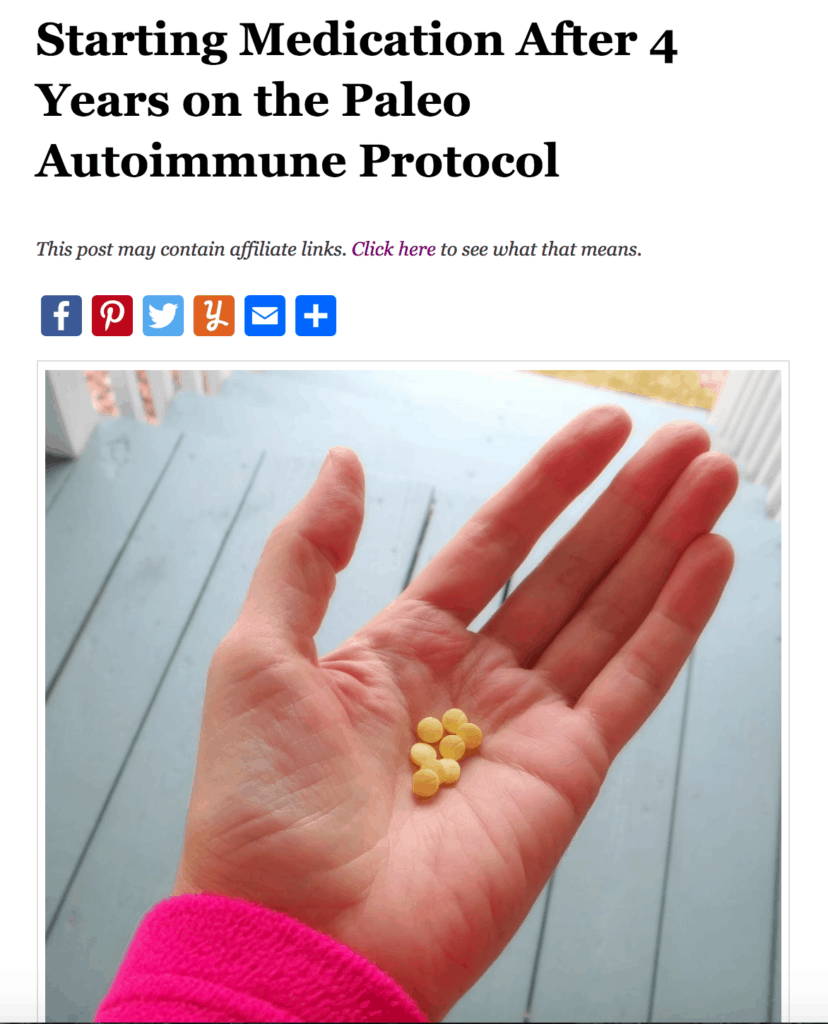
Fluoride should absolutely be strictly avoided by anyone with arthritis. But kombucha apologists like Sarah are not telling their readers about how much fluoride it has.

And sadly, Eileen from Phoenix Helix is now spreading this misinformation to her readers:
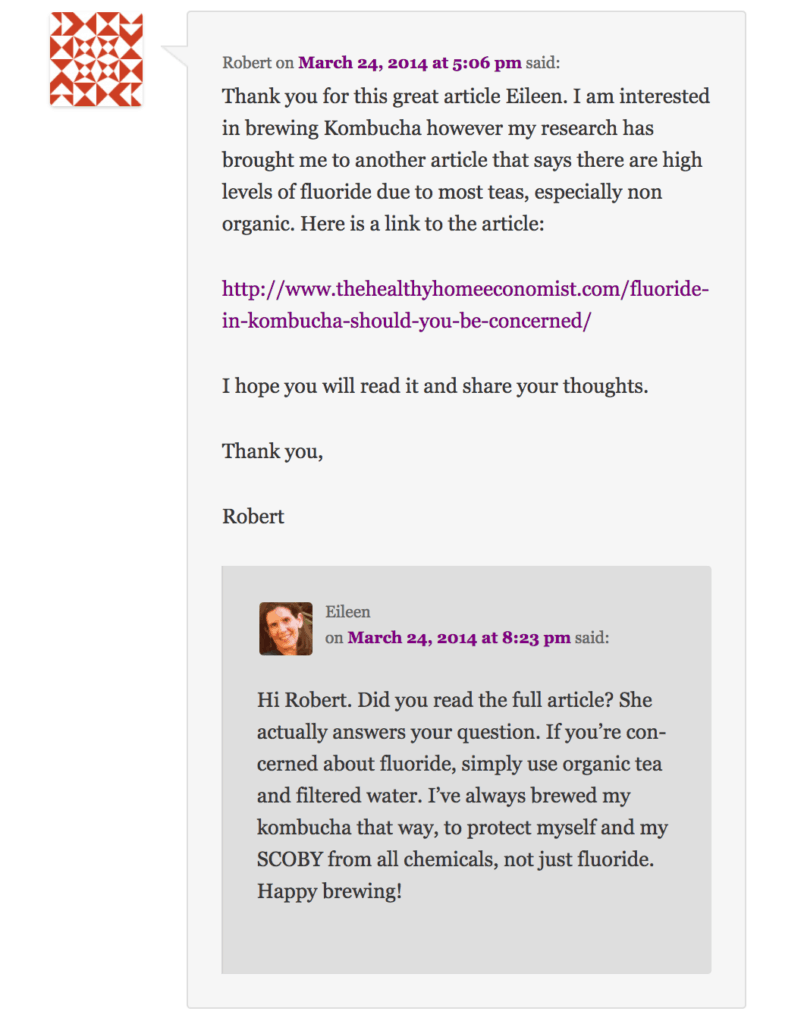
This whole fluoride issue may explain why people say things like “the GAPS diet didn’t work for me so I switched to AIP” and “I was on AIP for 4 years and had to start back on medication.”
If fluoride is not addressed and removed from the diet, especially for people who have hormonal issues like hypothyroidism and Hashimoto’s disease, many people will not get well even if they are eating a super-restricted, nutrient-dense diet.
Nourished Kitchen
One of my readers recently brought a post to my attention by Jenny McGruther at Nourished Kitchen. She defends brewing and drinking kombucha despite the fact that it is high in fluoride.

This post is very similar to the Healthy Home Economist post. She makes a couple different points… which I’ll highlight…
Wine and Black Pepper Have Fluoride
Jenny says her readers are worried, but she reassures them by saying lots of things have fluoride — like wine and black pepper.

It’s true that wine is very high in fluoride, but not all wine is. It depends where the wine is produced and whether or not it is organic.
This is due to the fact that cryolite, a fluoride-based pesticide, is what adds the fluoride to the wine. (Source)
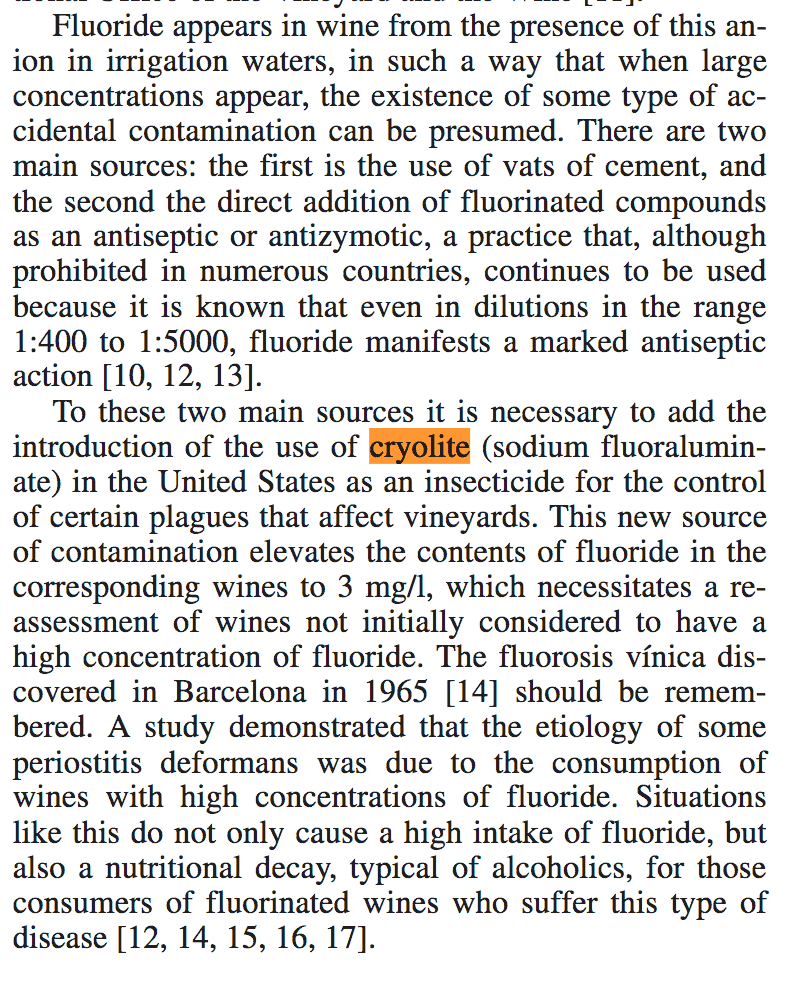
And Jenny’s point about black pepper? Um… wow. Black pepper? How much black pepper does one person eat in a day? An eighth of a teaspoon at most? Yeah, not sure why she even brought that up.
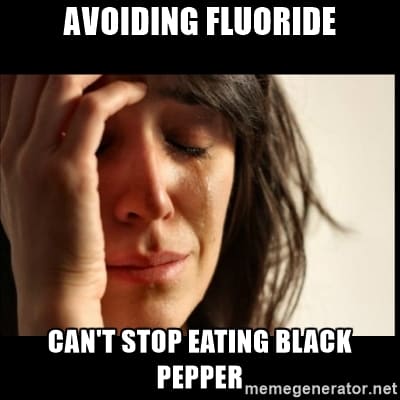
Jenny’s Recommendations to Reduce Fluoride in Kombucha
Like Sarah Pope, Jenny has a number of ideas for how you can reduce the fluoride in your booch. It’s mostly cribbed from Sarah’s post… but she does have one difference.
Avoid Drinking “Quarts of Cheap Tea”
In Jenny’s post, she basically tells people it’s fine to keep drinking kombucha as long as you don’t drink “quarts” of kombucha made with “cheap tea”.
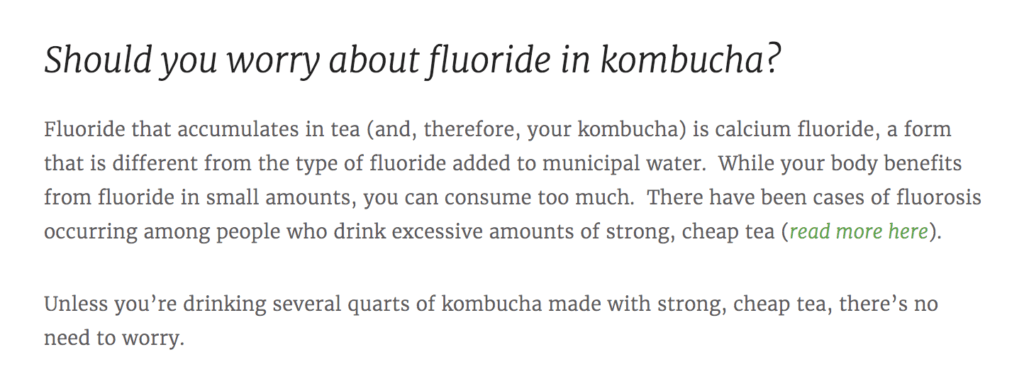
While Sarah says she drinks up to 12-16 ounces a day and lets her children have up to 8 ounces per day, McGruther says that she recommends only drinking “a few ounces” a day. So what, like 3 or 4 ounces? Half a cup? I don’t know about you but I don’t drink half a cup of anything… especially if I’m going to the trouble of brewing my own kombucha, which she recommends.
And as I said above, if you live in America, the optimal amount of fluoride recommended for an adult woman is only 1.6 mg per day. And a cup of tea has anywhere from .2 mg to 2 mg of fluoride. We don’t know how much fluoride kombucha has… it could be as much as 3 times the amount in black tea.
So, you could be getting as much as 3 mgs of fluoride in half a cup of kombucha, which is double the recommended daily amount for adult women.
Needless to say, this is supremely bad advice!
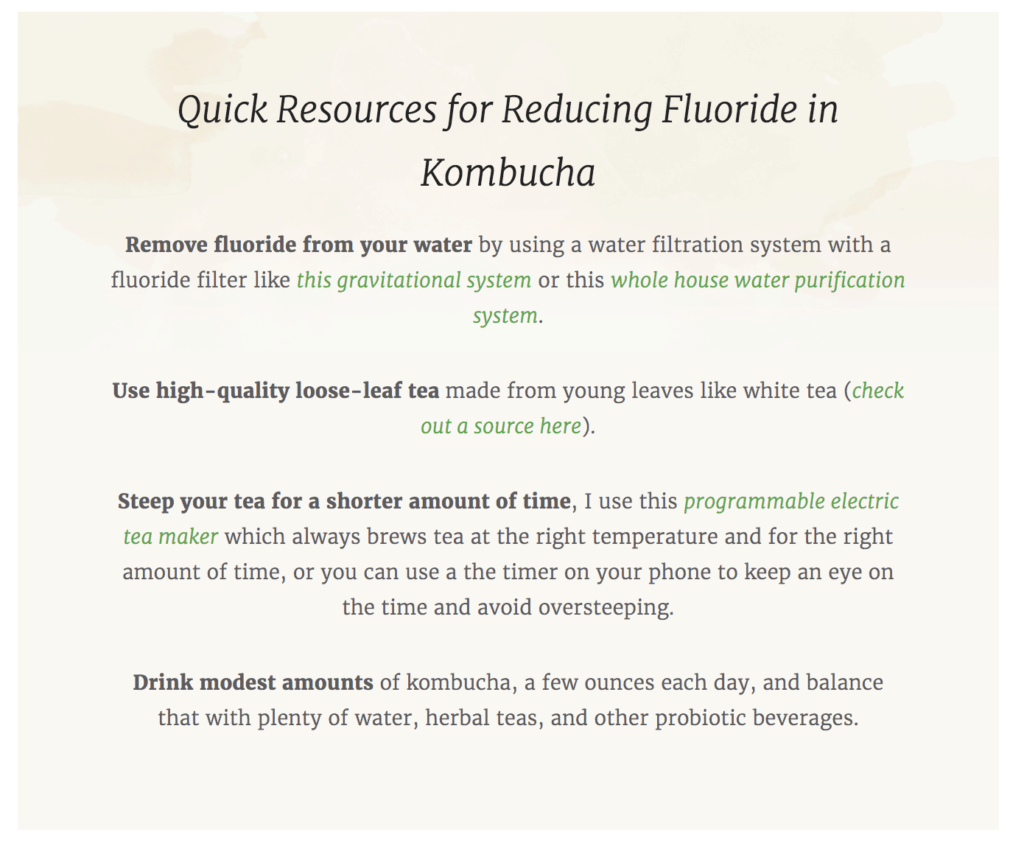
Jenny McGruther’s Bias
Jenny has a lot of affiliate links in her post, which is fine, I don’t begrudge anyone that. Almost all bloggers use affiliate links. Jenny also has a long-standing relationship with the Weston Price Foundation and the Kombucha Mamma, Hannah Crum of Kombucha Kamp.

Ah, well what do you know? There’s that affiliate link to Kombucha Kamp. Like I said, I don’t care if people use affiliate links. I think it’s great that bloggers make money from educating people about health.
But when health bloggers ignore the health of their readers in order to make money off them (and these bloggers do make very good money, trust me,) this is really unethical.
Especially when you see comments like this one…
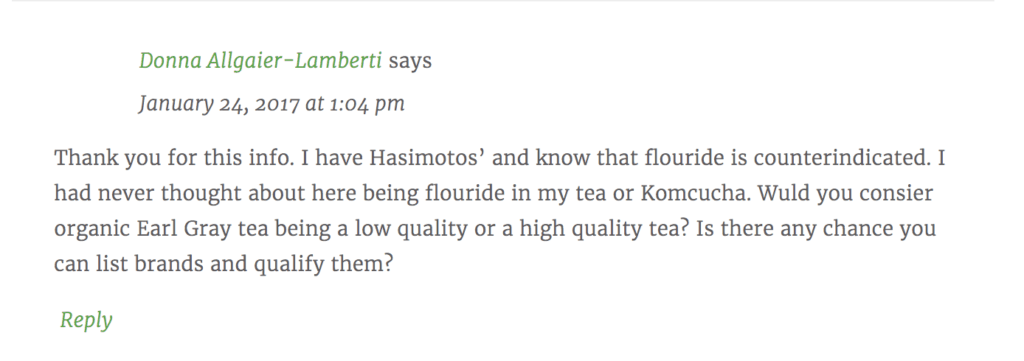
This reader, Donna, tells Jenny she has Hashimoto’s Thyroiditis, a disease that is directly linked to fluoride exposure. Donna even tells Jenny that she can’t consume fluoride.
Watch how Jenny answers:
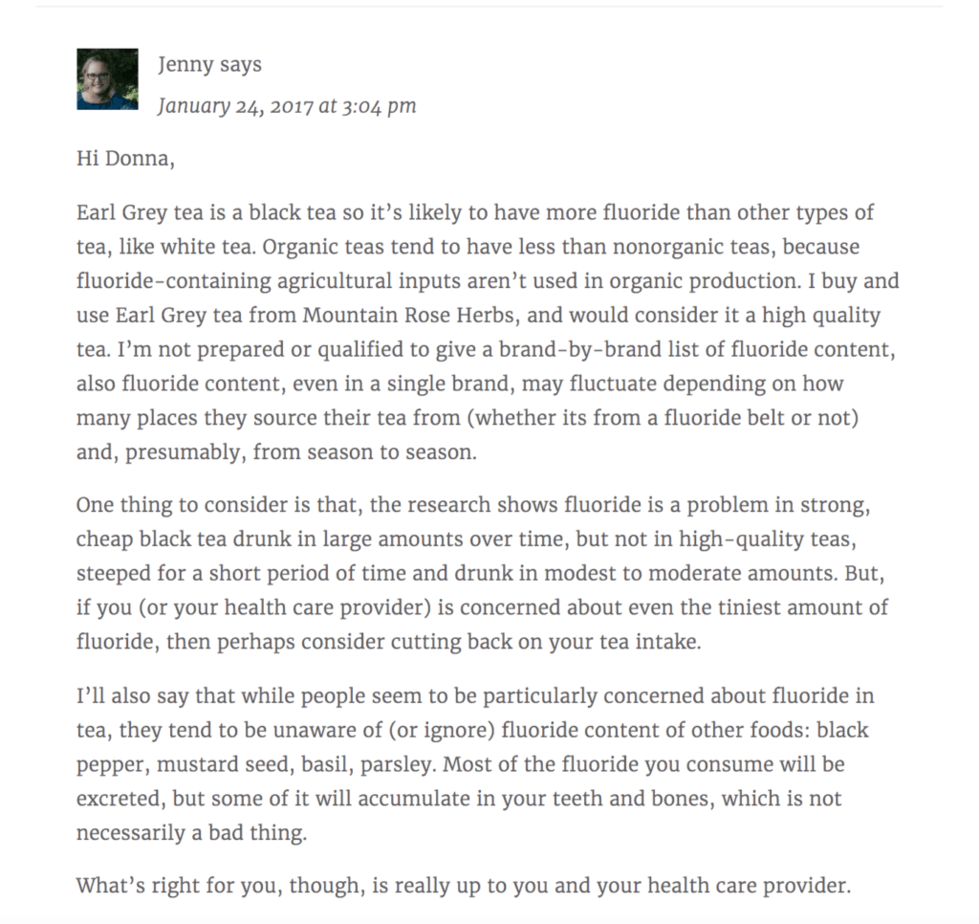

The black pepper again. Oh, yeah, and all the parsley we eat on a daily basis.
Really, Jenny?
Food Renegade
Kristin Michaelis of Food Renegade also promotes kombucha… her post on the health benefits of kombucha ranks very high, in the top 5 results for kombucha on the first page Google. I know this because I taught her all my SEO (search engine optimization) tricks back in the day, which I learned from one of my husband’s friends who is one of the top SEO guys in the world. She used those tips to write this article.

Michaelis’ kombucha post has been up for several years, but it doesn’t mention anything about fluoride.
And when one of her readers asked in the comments section, “what about the fluoride in tea?” she never answered. I’m sure this is not the only time she has been asked this question.

Kristen Michaelis’ Bias
I’m sure Michaelis probably doesn’t want to stop promoting kombucha because it would definitely hurt her search engine traffic to take that post down or modify it. She probably makes a lot of money from her affiliate links.
Maybe after Michaelis sees my post, she’ll consider doing the right thing, and updating her post to inform people of the dangers of fluoride in kombucha. I hope so!
Conclusion
It’s clear that tea and kombucha are high in fluoride. Health bloggers who downplay this fact and who continue to promote kombucha as a “health tonic” are doing their readers a big disservice.
We know that fluoride has a 20 year half life. That means that if you stopped consuming fluoride right now, half of the fluoride that is in your body will be there for another 20 years. It is not easy to get rid of fluoride that has accumulated in the body (mostly in bones and teeth but also in the thyroid, ovaries and breasts). For those of us struggling with health issues such as thyroid disorders, cysts in the breasts or the ovaries, bone loss, cavities, migraine headaches, arthritis, infertility (and many more) adding MORE fluoride to our diet will only aggravate and worsen these conditions.
It is extremely important that we health bloggers educate our readers about the dangers of fluoride consumption. I hope that this post will help to spread the word.
Fluoride in Kombucha? Why I Stopped Drinking Kombucha and Tea
If you want to learn more about fluoride in kombucha (because you that post wasn’t LONG ENOUGH — LOL), you can watch this short video I made:
You can also read my post about fluoride in kombucha and why I no longer drink kombucha or tea.
Share Your Comments Below
Do you have experience with fluoride in kombucha or tea? Please share below.
Pin This Post
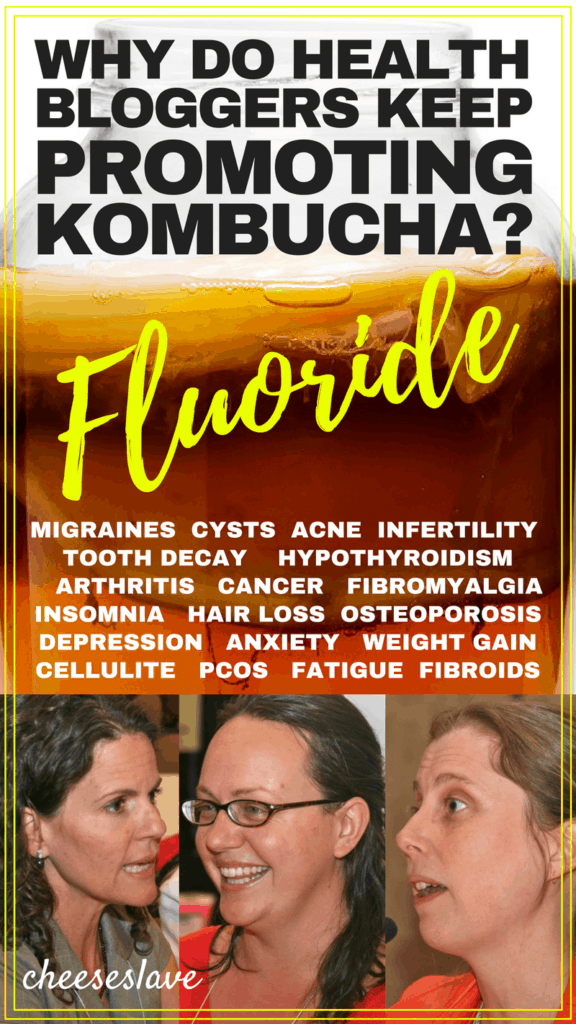



Comments ()